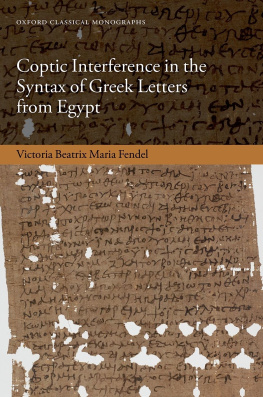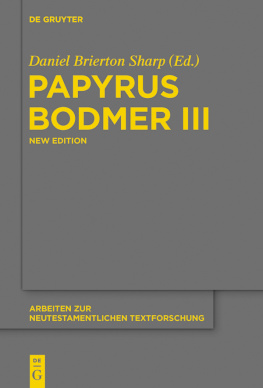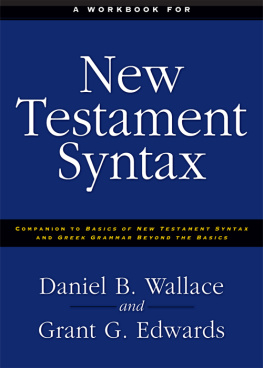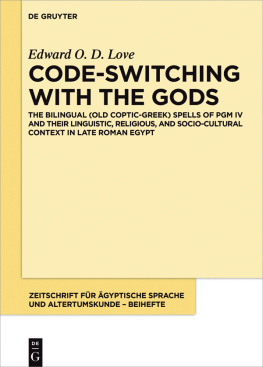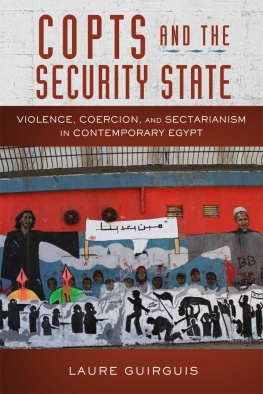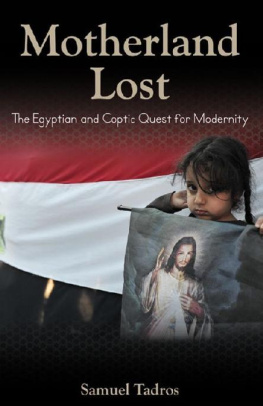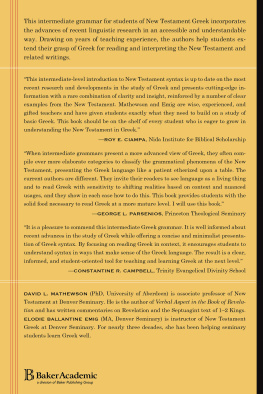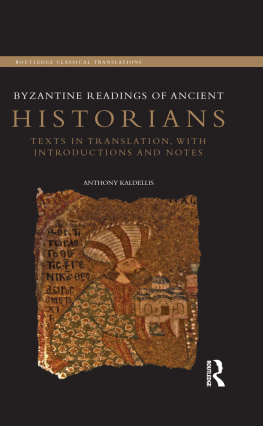The aim of the Oxford Classical Monographs series (which replaces the Oxford Classical and Philosophical Monographs) is to publish books based on the best theses on Greek and Latin literature, ancient history, and ancient philosophy examined by the Faculty Board of Classics.
Oxford University Press is a department of the University of Oxford. It furthers the Universitys objective of excellence in research, scholarship, and education by publishing worldwide. Oxford is a registered trade mark of Oxford University Press in the UK and in certain other countries
All rights reserved. No part of this publication may be reproduced, stored in a retrieval system, or transmitted, in any form or by any means, without the prior permission in writing of Oxford University Press, or as expressly permitted by law, by licence or under terms agreed with the appropriate reprographics rights organization. Enquiries concerning reproduction outside the scope of the above should be sent to the Rights Department, Oxford University Press, at the address above
You must not circulate this work in any other form and you must impose this same condition on any acquirer
Links to third party websites are provided by Oxford in good faith and for information only. Oxford disclaims any responsibility for the materials contained in any third party website referenced in this work.
Acknowledgements
I am deeply grateful to my DPhil supervisor, Andreas Willi, who guided me all the way through the storms and calms of this study. For his never-ending insistence, his endless patience, his constant encouragement, and the countless hours he spent reading and discussing with me every single word of this study, I owe him my greatest thanks. My thanks go also to his opposite number, Gesa Schenke, who battled through the Coptic half of this study with me and never ceased to be enthusiastic and thus provide me with reassurance. Furthermore, I owe thanks to Wolfgang de Melo, who advised me on how to transform a DPhil thesis into a monograph. For his witty anecdotes, his consistently constructive criticism, and his enlightening comparisons, I am immensely grateful.
In addition, my college advisors, Amin Benaissa and Helen Kaufmann, the two directors of graduate studies I worked with during my time at Oxford, Felix Budelmann and Gregory Hutchinson, and my teaching mentor, Juliane Kerkhecker, were a constant source of support. They all contributed to creating a stimulating environment and helped me to overcome all the little hurdles on the way. Equally, all the staff of the Classics faculty, in particular the Craven committee, and the Bodleian libraries had their share in making for this wonderful experience.
Furthermore, I owe thanks to Matthias Mller (Basel) for his interminable willingness to advise me on all questions of Coptic linguistics and for the manuscripts of several forthcoming publications of his. Equally, I owe thanks to Willy Clarysse (Leuven) for providing me with the manuscript of a very insightful article on later Greek formulaic language as well as to Joanne Vera Stolk (Ghent) and Klaas Bentein (Ghent) for allowing me to read their brilliant forthcoming articles on post-classical Greek linguistics.
I would not be at Oxford and this study would not exist without the generosity of Lady Margaret Hall and the Classics faculty, who awarded to me a Clarendon scholarship. This allowed me to focus fully and exclusively on my academic work. I will always be deeply indebted to both institutions.
My thanks go further to the two kind native speakers who identified all my interferences, hypercorrections, and language-internal confusions of patterns, to Thomas McConnell and Jonathan Griffiths. They analysed my writing at least as meticulously as I analysed my Greek data.
Finally, too many people have been on this journey with me to name all of them. For their optimism, their encouragement and their reliability throughout this journey, I am indebted to Stephanie Johann (Mannheim), Florence Becher-Husermann (Basel), Roxanne Taylor (Oxford/Manchester), Alexander Fairclough (Cambridge), Alexandre Loktionov (Cambridge), and Matthew Ireland (Cambridge) as well as my parents, Andreas and Brigitte, and my siblings, Leonard and Sophie.
Victoria Beatrix Maria Fendel
Oxford
12 April 2021
Contents
Achmimic dialect of Coptic
Greek accusative case
accusative with infinitive
adverbial
archive of Apa John
archive of Apa Nepheros
archive of the Apiones of Oxyrhynchos
aorist tense (in Coptic, the unmarked form of the aorist tense is referred to)
archive of Apa Paieous
article (ART.DEF = definite article/ART.INDF = Coptic indefinite article)
attributive
auxiliary verb
Bohairic dialect of Coptic
classical Greek
Coptic causative infinitive
Coptic conditional conjugation
Coptic conjunctive
Greek copular verb/Coptic non-verbal copula
complement
Coptic circumstantial conversion
archive of Dioscoros of Aphrodito
Greek dative case
dative with infinitive
definite
demonstrative pronoun
Coptic direct object marker
feminine gender
future tense (in Coptic, the unmarked form of the future tense is referred to)
marked form of the Coptic future tense
modal form of the Coptic future tense (optative)
genitive with infinitive
Greek genitive case
infinitive marker
imperative
Coptic imperfect conversion/Greek imperfect tense
indefinite
infinitive
interjection
Coptic jussive
Lyko-Diospolitan dialect of Coptic
light verb
light-verb construction
masculine gender
Mesokhemic dialect of Coptic
Coptic marker of attribution
main clause/independent clause
modern Greek
neutral gender
nominative with infinitive
Greek nominative case
New Testament
Greek optative
post-classical Greek
Coptic precursive
predicative
archive of the village of Kellis (Greek texts)
archive of the village of Kellis (Coptic texts)
plural
predicative noun in a support-verb construction
possessive
present tense (in Coptic, the unmarked form of the present tense is referred to)
marked form of the Coptic present tense
perfect tense (in Coptic, the unmarked form of the perfect tense is referred to)
marked form of the Coptic perfect tense
pronoun
preposition
particle
Greek participle

